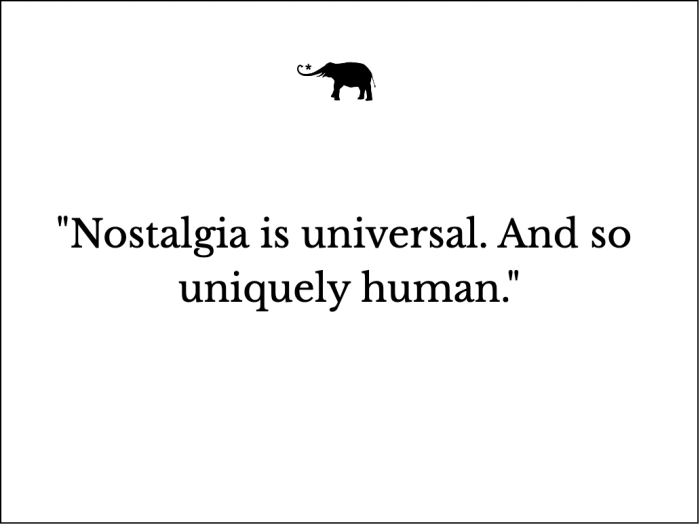Research indicates that nostalgia has a mood-boosting effect, as well as increases a sense of meaning in one’s life while raising self-esteem and optimism for the future. However, contrary to these positive effects, the term nostalgia was coined in the 17th century by a Swiss doctor to name a condition he identified as a mania tied to homesickness in Swiss mercenary soldiers. He described this condition as “a disease of essentially demonic cause.” The word is a Greek compound, with “nost” meaning homecoming and “algia” means sorrow, despair, or pain. The diagnosis went out of fashion by the 19th century and transitioned into the meaning we assign it now: when a longing from something from the past or far away takes hold; is a sentimentality for the past, typically for a period or place with happy personal associations. We’ve all experienced this. Whether it stems from a song, or a smell, or driving down a certain street.
The holidays in particular are likely to raise feelings of nostalgia. Coming home for the holidays — literally the “nost” in the word. Some of us sleep in our childhood bedrooms, some revert back to the maturity level they were at as a teenager living in their childhood house, and some participate in decades-old (or generations-old) traditions that spark memories of lighting candles or decorating a tree at age six.
This year, I spent the past two+ weeks with my parents, a portion of that time at a resort that I grew up going to. Walking into the lobby, the Moroccan-style domed ceiling towering above me, and the Christmas tree ten times my height, memories of my child-self rushed into my consciousness. Swimming underneath the “bridge” in the pool with my brother, yelling “echo” and listening for the “echo” responses. Hoisting myself out of the pool to run up the stairs, listening for the “no running” command from the lounge chairs, and wading into another pool (where, on this trip, I frequented the pool bar) to the entrance of the waterslide. Twenty years later, I still giggled the entire way down the slide. I even got stung by a bee on this trip (something that, in my mind, only happens to a child).
Each day, we lounged near a family of three generations — grandparents, their children, and their children’s children — who had also been visiting this resort since it opened 30 years ago. I felt a sense of nostalgia again. I was the child’s child at one point. Chasing my brother on the grassy area by the pool. Constantly demanding my parents’ attention, steering them away from their hopes of relaxation. I realized this scene that sparked nostalgia allowed me glimpses of both the past and the future. I imagined myself as the child’s child while also imagining myself as the child parenting the child’s child. I felt grateful for the traditions my parents still carry on (I know not everyone has that). I felt excited, and emotional in the best way, for the responsibility to carry those traditions on to my own family. And I felt the importance of creating the memories that would form the basis for nostalgia in the future.
For me, nostalgia has the power to spur both happy and melancholy feelings. Nostalgia can be bittersweet. My awareness of nostalgia this month is heightened due to visiting places I visited as a child and spending time with family. Nostalgia can also be a challenging emotion — it can bring up grief, anger, resentment, or a sense of longing, taking us away from the present and transporting us into the past. Nostalgia can be beautiful too — sparking appreciation, optimism, and laughter. Nostalgia is universal. And so uniquely human.












Read 0 comments and reply